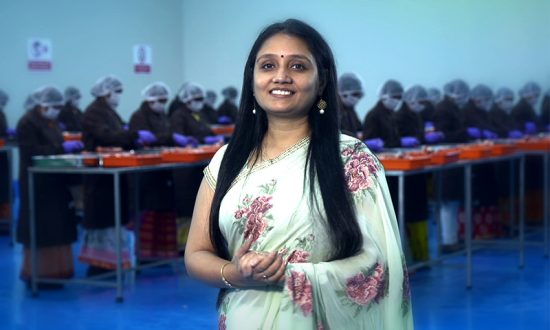Purnima Khandelwal has an experience of over 17 years as an entrepreneur, and is the first woman CEO of a professionally run horticulture company from India. She was responsible for setting up sales platform in 35 countries spanning 4 continents and has led INI Farms to become the largest Indian exporter of pomegranate and banana. Purnima is also the driving force behind creating India’s first ‘safe food’ brand, Kimaye, leading the entire gamut of brand building initiatives from consumer insights to packaging innovations to distribution.
While women play a crucial role in agricultural development and allied fields, their contributions are largely overlooked and undervalued even today. Despite playing a vital role in the agricultural workforce, a significant number of women still remain as invisible contributors and unpaid laborers in the sector. The role of women in the agricultural sector cannot be ignored as the sector employs around 80% of all economically active women in India.
Although the situation is evolving over time, there are huge strides left to be made in uplifting the status of women labor in agriculture and providing them the adequate support required to prosper in various aspects of the sector.
Agriculture works assigned to women in rural areas are quite typical and include tasks like sowing, transplanting, weeding, and harvesting. Subsistence farming is also commonly practiced by women as unpaid work. These problems are further accentuated by the tribulations of illiteracy, unemployment, and poverty. Due to the education barrier, women are unable to participate in more skilled sectors of the workforce, and thus have to settle for lower wages. Aside from this, women also take the burden of ensuring the well-being of their household in addition to working in the field for the same amount of time as men. Women also earn lesser despite equal or more work due to the wage disparity that exists; almost 22 percent lesser than their male counterparts, as per a report on agricultural statistics released by the Minister of Agriculture and Farmers’ Welfare.
Women also have little control over decisions made about land holdings in India. Reports estimate that, in India, only 13 percent of the land belongs to women in the farming sector. While they may hold the land title, they may not actually have the power to decide on cropping, sale, mortgage, or purchase. Their freedom is consistently impeded by patriarchal practices and conservative social structures. Besides these, they also have difficulty obtaining credit, technology, agricultural inputs, and services.
Breaking free from traditional roles and seeking to gain a stronger financial foothold also possesses challenges for women. Family conflict, education and awareness gaps, weak government assistance, management issues, limited mobility, social-culture barriers, and difficulty finding finance and raw materials are some of the challenges.
A critical goal of the agriculture sector should be to acknowledge the role and increase the contribution of women. In order to meet the needs of women farmers, it is imperative to revamp the entire approach towards them. Empowering women farmers through community institutions is essential to achieve sustainable livelihoods. This would increase their participation, improve their productivity, and allow them to improve their quality of life. The way to achieve this is by investing in building capabilities, skills, and knowledge.
Women need access to new technologies and innovations to become more active participants in technology-enabled supply chains that are more efficient, transparent, and responsive. This can enable them to increase their overall output and income. Incorporating Self-Help Groups (SHGs) as social enterprises for empowering women and promoting sustainability can increase the capacity of women in rural areas around skill-building, financial literacy, and market exposure. It is vital in today’s digital age to provide instruction and training on ways to monitor the market, weather information, and access financial services, which will ease their efforts to make quicker and more acceptable digital payment options. It would also be potentially beneficial to increase women’s ownership of land and to create supportive legislation.
India’s farm sector needs to implement policies to promote women’s inclusion, provide women with loans for small businesses, and provide them with entrepreneurial opportunities. The use of cooperative models such as Farmer Producer Organizations (FPOs) will make women farmers more capable of engaging in value chain activities and taking on leadership roles. Creating and implementing initiatives that promote an inclusive work environment and long-term goals that will facilitate the advancement of women in the workplace is essential.
Through various policies and development interventions, it should be made possible for women to equalize their standing in agriculture with their male counterparts, in an effort to counter the paradox of high female participation and limited agricultural benefits. There have also been various schemes implemented by the government to improve the rights of women entrepreneurs. In addition to this, they should also increase efforts and funding to aid women’s economic empowerment, ensuring equal pay, give special attention to and reward organizations that advocate for gender equality, fund women’s projects, and boost a network of women in business. Only when women are given the opportunities and the freedom, will they be able to play a greater role in contributing to the development of the rural economy and pave way for more women to be part of this ecosystem.


